人教版英语八年级下册英语第5单元知识点归纳
人教版八年级下册英语Unit5知识点总结
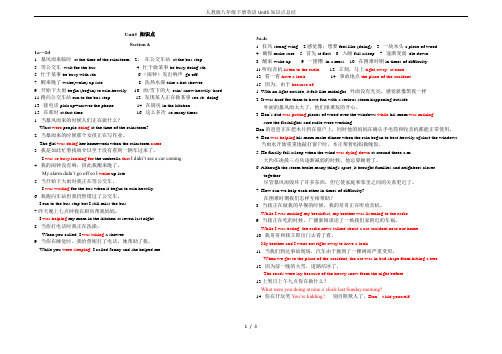
Unit5 知识点Section A1a—2d1. 暴风雨来临时at the time of the rainstorm 2、在公交车站at the bus stop3. 等公交车wait for the bus4. 忙于做某事be busy doing sth.5. 忙于某事be busy with sth.6.(闹钟)发出响声go off7. 醒来晚了wake(woke) up late 8. 洗热水澡take a hot shower9. 开始下大雨begin (began) to rain heavily 10. 雨/雪下的大rain/ snow heavily/ hard 11.跑向公交车站run to the bus stop 12. 发现某人正在做某事see sb. doing 13. 接电话pick up=answer the phone 14. 在厨房in the kitchen15. 在那时at that time 16. 这么多次so many times1. 当暴风雨来的时候人们正在做什么?What were people doing at the time of the rainstorm?2. 当暴雨来的时候那个女孩正在写作业。
The girl was doing her homework when the rainstorm came.3. 我是如此忙着找雨伞以至于没有看到一辆车过来了。
I was so busy looking for the umbrella that I didn’t see a car coming.4. 我的闹钟没有响,因此我醒来晚了。
My alarm didn’t go off so I woke up late.5. 当开始下大雨时我正在等公交车。
I was waiting for the bus when it began to rain heavily.6. 我跑向车站但我仍然错过了公交车。
人教版八年级下册英语Unit 5 知识点语法归纳总结
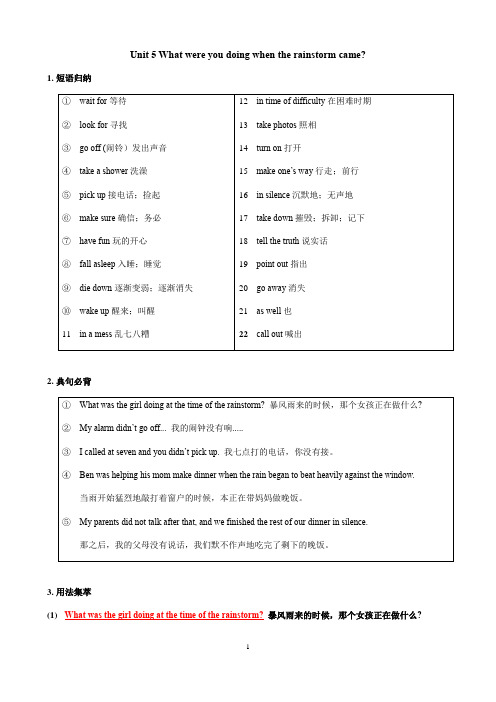
Unit 5 What were you doing when the rainstorm came?1.短语归纳2.典句必背3.用法集萃(1)What was the girl doing at the time of the rainstorm?暴风雨来的时候,那个女孩正在做什么?❖本句是特殊疑问句,时态是过去进行时,结构是“What+was/were+主语+doing+其他?”,用于询问某人在过去的某个时间正在做的事情。
例:—What were you doing at nine o’clock yesterday evening? 昨天晚上九点你正在做什么?—I was watching TV at home. 我正在家里看电视。
❖拓展:过去进行时描述过去某个时刻正在发生的动作或存在的状态,结构是“was/ were+动词的现在分词”。
例:When I got home my mother was cooking. 我到家的时候我妈妈正在做饭(2)My alarm didn’t go off... 我的闹钟没有响.....❖go off意为“(闹钟)发出响声”例:My alarm goes off at six every morning. 我的闹钟每天早晨6点响。
❖归纳:go off还有“离开”和“变质”之意。
例:Bob went off to get a drink. 鲍勃拿饮料去了。
Meat goes off quickly in hot weather. 热天肉变质得快。
❖拓展:go的短语(3)I called at seven and you didn’t pick up. 我七点打的电话,你没有接。
❖pick up意为“接电话”。
pick up有如下含义:(4)I called again at eight and you didn’t answer then either. 我八点再打来,你也没接。
[精]人教版八年级英语下册Unit5-6 单元短语归纳
![[精]人教版八年级英语下册Unit5-6 单元短语归纳](https://img.taocdn.com/s3/m/580b3f5bda38376bae1fae06.png)
人教版八年级英语下册Unit5-6 单元短语归纳unit5知识点总结1. at the time of the rainstorm 在暴风雨的时候2. at the bus stop 在公共汽车站3. wait for the bus 等公共汽车4. walk home 步行回家5. pick up 拾起,捡起;接电话(answer the phone)6. so many 那么多7. need help with 在某方面需要帮助8.①make +sb/sth+adj ②make+sb/sth+do sth ③make+sb/sth+动词过去分词④make+sb+n.9. make sure 确保,务必①make sure to do ②make sure+从句③make sure+that从句10.make dinner=cook dinner 做饭11.beat strongly against sth 猛烈击打;be against sth/doing sth 反对某事/做某事play against 与‥‥比赛12.have fun with sth‥‥事开心13. at first 开始,首先14. when the wind was dying down 当风减弱时15. fall asleep 睡着16. in a mess 一团糟17. fallen trees 倒下的树木18. broken windows 破碎的窗户19.clean up 彻底打扫20. break sth apart 把某物折断或分开;break apart 解体21.bring sb closer together 使人们的关系更密切22. in times of difficulty 在困难的时候23.right away 立刻,马上。
同义词:at once, right now, in a minute/moment24.talk about 谈论25.have a look 看一看, have a look at=look at 意为:看什么一看26.the car be in a bad shape from hitting a tree 汽车撞到树上严重变形27.because of 由于,因为28.the night before 前一晚29.by the side of the road 在路边30.wait for sb to do sth 等候某人做某事31.walk by 走过,路过32.make one’s way to 向…走去33.the news of …的消息34.on the radio在收音机上,在广播中35.in silence 默默地,沉默地。
人教版英语八下unit5笔记

人教版英语八下unit5笔记人教版英语八下unit5笔记一、词汇1. conduct: vt. 进行;组织;实施例句:He conducted a thorough investigation into the matter.2. argument: n. 争论;争吵;论点例句:They had an argument over the choice of restaurant.3. via: prep. 通过;经由;途径例句:You can get there via train or bus.4. mumble: v. 咕哝;含糊不清地说话例句:He mumbled an apology and left the room.二、重点语法该单元的语法重点为宾语从句,即由that或whether引导的从句作为动词或介词的宾语。
举例:1. She thinks that I should study harder.2. He is not sure whether he can make it to the meeting on time.3. The teacher explained that the test would be difficult.需要注意的是,当主句的主语和从句的主语相同时,宾语从句可以省略主语和be动词,例如:I think (that) he is a good student. = I think he is a good student.三、重要知识点该单元的重要知识点为讨论技巧,主要包括争论的步骤和技巧。
争论的步骤:1. 确定争论的问题;2. 阐述各自的观点;3. 提出证据支持自己的观点;4. 回应对方观点的反驳;5. 总结讨论,得出结论。
争论的技巧:1. 保持冷静并尊重对方的意见;2. 清晰准确地表达自己的观点;3. 寻找和展示证据;4. 有效地回应反驳,并提出反驳对方观点的论据;5. 结合事实论证自己的观点;6. 最终解决问题,达成共识。
人教版八年级英语下册第五单元知识点汇总总结
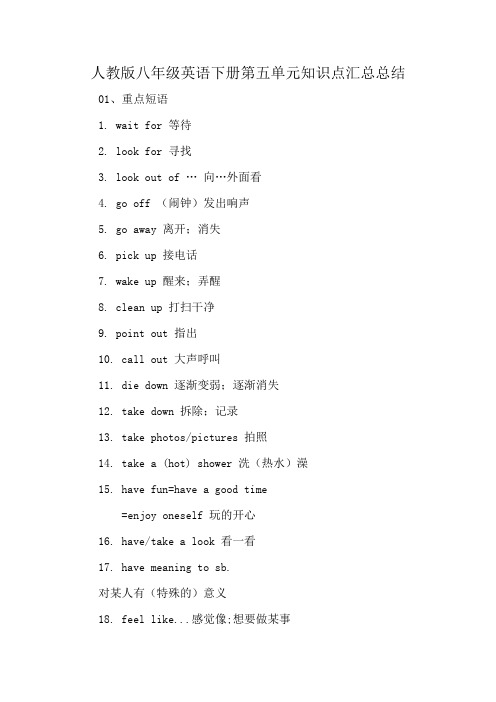
人教版八年级英语下册第五单元知识点汇总总结01、重点短语1. wait for 等待2. look for 寻找3. look out of … 向…外面看4. go off (闹钟)发出响声5. go away 离开;消失6. pick up 接电话7. wake up 醒来;弄醒8. clean up 打扫干净9. point out 指出10. call out 大声呼叫11. die down 逐渐变弱;逐渐消失12. take down 拆除;记录13. take photos/pictures 拍照14. take a (hot) shower 洗(热水)澡15. have fun=have a good time=enjoy oneself 玩的开心16. have/take a look 看一看17. have meaning to sb.对某人有(特殊的)意义18. feel like...感觉像;想要做某事19. make sure 务必,确保20. beat against 敲打21. fall asleep 进入梦乡22. break … apart 使…支离破碎23. turn on打开 (反:turn off关上)24. listen to the radio 听收音机25. get to = arrive in/at 到达26. make one’s way to 前往;费力前行27. to tell the truth 说实话28. walk by 路过29. at the time of …在…的时候30. in a mess 凌乱不堪;乱七八糟31. in times of difficulty 在困难时期32. because of 因为33. in history 在历史上34. in silence 沉默,无声35. at first 起初;起先36. by the side of …在…旁边37. the rest of …剩余的38. each other 互相39. for example 例如40. as well 也02、重点句子Grammar Focus 句子1. What were you doing at eight last night?昨天晚上8点你在做什么?I was taking a shower.我在洗淋浴。
人教八年级下Unit5知识点总结
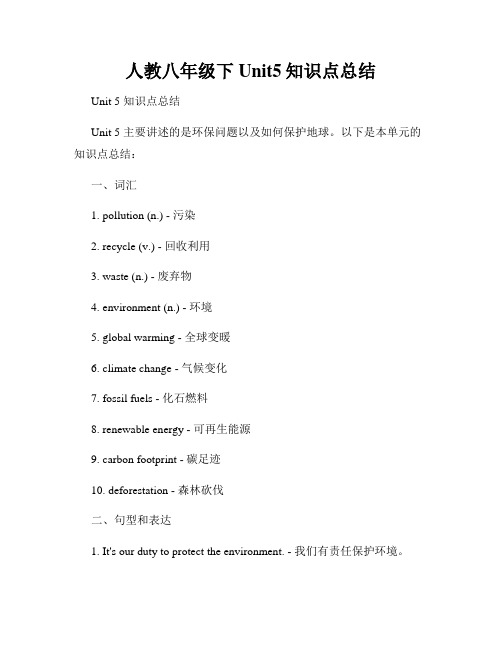
人教八年级下Unit5知识点总结Unit 5 知识点总结Unit 5 主要讲述的是环保问题以及如何保护地球。
以下是本单元的知识点总结:一、词汇1. pollution (n.) - 污染2. recycle (v.) - 回收利用3. waste (n.) - 废弃物4. environment (n.) - 环境5. global warming - 全球变暖6. climate change - 气候变化7. fossil fuels - 化石燃料8. renewable energy - 可再生能源9. carbon footprint - 碳足迹10. deforestation - 森林砍伐二、句型和表达1. It's our duty to protect the environment. - 我们有责任保护环境。
2. We should reduce, reuse, and recycle to save resources. - 我们应该减少、重复使用和回收利用以节约资源。
3. Global warming is a serious issue that we need to address. - 全球变暖是一个我们需要解决的严重问题。
4. Using renewable energy can help reduce carbon emissions. - 使用可再生能源可以帮助减少碳排放。
5. Deforestation leads to the loss of biodiversity. - 森林砍伐导致了生物多样性的丧失。
三、文章内容地球是我们的家园,保护环境是我们每个人的责任。
环境污染是地球面临的一个重大问题。
从空气污染到水污染,我们需要采取行动来减少污染物的排放。
例如,我们可以减少使用汽车、使用可再生能源以及回收和重复使用废物。
全球变暖和气候变化也是当前的重要议题。
人教版英语八年级下册Unit5知识点
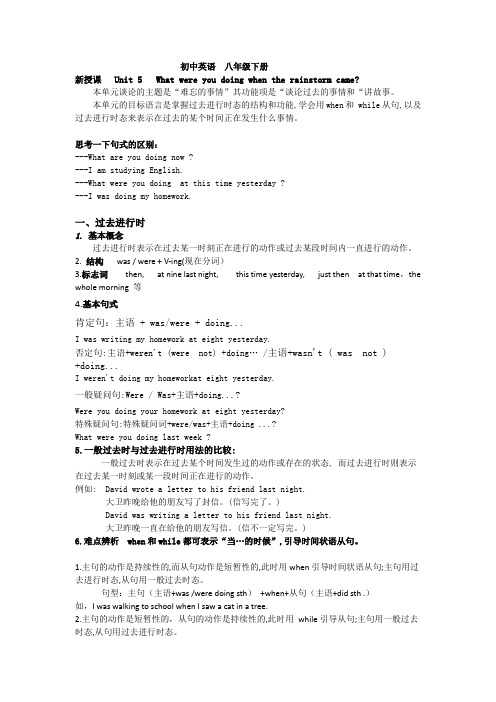
初中英语八年级下册新授课Unit 5 What were you doing when the rainstorm came?本单元谈论的主题是“难忘的事情”其功能项是“谈论过去的事情和“讲故事。
本单元的目标语言是掌握过去进行时态的结构和功能,学会用when和 while从句,以及过去进行时态来表示在过去的某个时间正在发生什么事情。
思考一下句式的区别:---What are you doing now ?---I am studying English.---What were you doing at this time yesterday ?---I was doing my homework.一、过去进行时1.基本概念过去进行时表示在过去某一时刻正在进行的动作或过去某段时间内一直进行的动作。
2. 结构was / were + V-ing(现在分词)3.标志词then, at nine last night, this time yesterday, just then at that time,the whole morning 等4.基本句式肯定句:主语 + was/were + doing...I was writing my homework at eight yesterday.否定句:主语+weren't (were not) +doing… /主语+wasn't ( was not )+doing...I weren't doing my homeworkat eight yesterday.一般疑问句:Were / Was+主语+doing...?Were you doing your homework at eight yesterday?特殊疑问句:特殊疑问词+were/was+主语+doing ...?What were you doing last week ?5.一般过去时与过去进行时用法的比较:一般过去时表示在过去某个时间发生过的动作或存在的状态, 而过去进行时则表示在过去某一时刻或某一段时间正在进行的动作。
人教版英语八年级下册单元Unit 5 知识点+测试卷+思维导图

Unit 5 What were you doing when the rainstormcame?1.重点词汇:date, area, storm, wind, light, match, silence, beat, begin, realize, report, rise, strange, asleep, completely, suddenly, heavily, recently...2. 短语归纳:1. go off (闹钟)发出响声2. pick up (=pick up the phone)接电话3. fall sleep 进入梦乡;睡着4. die down 逐渐变弱;逐渐消失5. have a look 看一看6. make one’s way 前往;费力地前进7. in silence 沉默;无声8. take down 拆除;往下拽;记录9. at first 首先;最初3. 必背典句:1. What were you doing at eight last night?昨晚八点你正在做什么?2. He was reading in the library when the rainstorm came.当暴风雨来临时他正在图书馆里看书。
3. What was Jenny doing while Linda was sleeping?当琳达在睡觉的时候杰妮正在做什么?4. While Linda was sleeping, Jenny was helping Mary with her homework.当琳达在睡觉的时候,杰妮正帮助玛丽辅导家庭作业。
4.语法知识:过去进行时1. 过去进行时由“was/were+动词-ing”构成,表示在过去某一时刻或某一段时间内正在进行的动作。
常见的时间状语有:at night yesterday morning, at that time, then, at this time yesterday等。
最全面人教版八年级下册英语第五单元知识点归纳总结
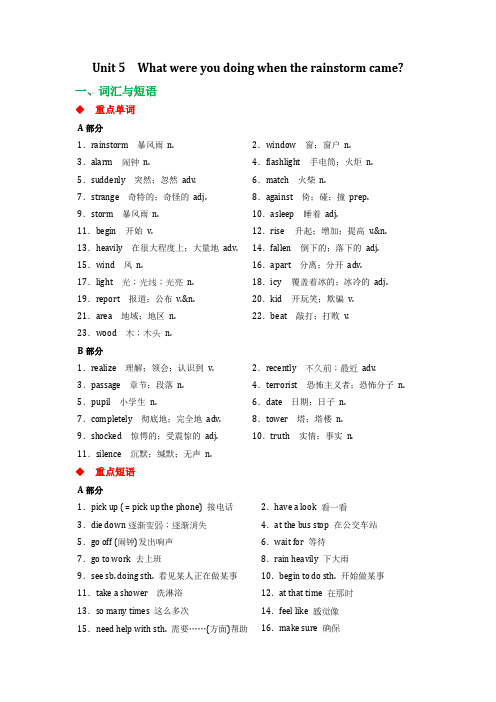
Unit 5 What were you doing when the rainstorm came?一、词汇与短语◆重点单词A部分1.rainstorm 暴风雨n.2.window 窗;窗户n.3.alarm 闹钟n.4.flashlight 手电筒;火炬n. 5.suddenly 突然;忽然adv.6.match 火柴n.7.strange 奇特的;奇怪的adj.8.against 倚;碰;撞prep. 9.storm 暴风雨n.10.asleep 睡着adj.11.begin 开始v.12.rise 升起;增加;提高v.&n. 13.heavily 在很大程度上;大量地adv.14.fallen 倒下的;落下的adj. 15.wind 风n.16.apart 分离;分开adv. 17.light 光;光线;光亮n.18.icy 覆盖着冰的;冰冷的adj. 19.report 报道;公布v.&n.20.kid 开玩笑;欺骗v.21.area 地域;地区n.22.beat 敲打;打败v.23.wood 木;木头n.B部分1.realize 理解;领会;认识到v.2.recently 不久前;最近adv. 3.passage 章节;段落n.4.terrorist 恐怖主义者;恐怖分子n. 5.pupil 小学生n.6.date 日期;日子n. 7.completely 彻底地;完全地adv.8.tower 塔;塔楼n.9.shocked 惊愕的;受震惊的adj.10.truth 实情;事实n. 11.silence 沉默;缄默;无声n.◆重点短语A部分1.pick up ( = pick up the phone) 接电话2.have a look 看一看3.die down逐渐变弱;逐渐消失4.at the bus stop 在公交车站5.go off (闹钟)发出响声6.wait for 等待7.go to work 去上班8.rain heavily 下大雨9.see sb. doing sth. 看见某人正在做某事10.begin to do sth. 开始做某事11.take a shower 洗淋浴12.at that time 在那时13.so many times 这么多次14.feel like 感觉像15.need help with sth. 需要……(方面)帮助16.make sure 确保17.with no light outside 外面没有灯光18.help sb. (to) do sth. 帮助某人做某事19.put……over……把……覆盖在……上20.make dinner 做晚饭21.put sth. on the table 把某物放在桌子上22.play a card game 玩纸牌游戏23.beat heavily against the windows 猛烈地敲打着窗户24.get to the place of the accident 到达事故发生地25.have fun 玩得愉快26.wake up 醒来;叫醒27.at first 起初;起先28.in times of difficulty 在困难时29.fall asleep 进入梦乡;睡着30.right away 立刻;马上31.go outside with sb. 和某人一起出去32.in the library 在图书馆33.find sth. in a mess 发现……一片狼藉34.on the street 在大街上35.break sth. apart 把某物折断(或分开)B部分1.in silence 沉默;无声2.in history 在历史上3.take down 拆除;往下拽;记录4.remember doing sth. 记得做过某事5.make one's way 前往;费力地前进6.look out of the window 向窗外看7.the school basketball competition 学校篮球比赛8.have meaning to sb.对某人来说有意义9.walk by 从旁边经过10.point sth. out to sb. 向某人指岀某物11.by the side of the road 在路边12.go away 离开13.at the event 在这次活动中14.as well 也15.be late for 迟到16.call out the winner 宣布获胜者17.on this day 在这一天18.10 minutes ago 十分钟前19.on April 4 在四月四日20.be completely shocked 完全震惊了21.an important event 一次重要的事件22.the rest of 其余的23.on the radio 在收音机上◆重点句子A部分1.What were people doing yesterday at the time of the rainstorm?昨天暴风雨来临时人们正在干什么?2.when the rain storm suddenly came, what were you doing?当暴风雨突然来临时,你正在做什么?3.So while you were sleeping, I called Jenny and she helped me.因此在你睡觉的时候,我打电话给珍妮,她帮了我。
人教英语八年级下册第5单元重点知识总结

Unit 5 重点知识at the time of 当.......时候be killed 被杀害beat against... 拍打……break...apart 使……分离bring... together 使……靠拢by the side of the road 在路边die down 逐渐变弱;逐渐消失fall asleep 进人梦乡;睡着for example 例如go off (闹钟)发出响声have meaning to 对……有意义hear the news 听到这个消息important events in history 历史重大事件in a mess 一团糟in silence 沉默;无声in the area 在这个地区in times of difficulty 在困难的时候make one's way to.... 在某人去……的路上make sure 确信;确认miss the bus 错过公交车miss the event 错过这个事件more recently 最近地;新近on the radio 通过广播on TV 在电视上more than 50/over 50 50多(岁)pick up 接电话remember doing sth. 记得做过某事remember to do sth. 记得去做某事take a hot shower 洗热水澡take down 拆除;摧毁the Animal Helpline 动物保护热线the World Trade Center 世贸中心try doing sth. 尝试做某事try to do sth. 努力做某事wake up 醒来;叫醒……walk by 走路经过词法精选1.when和while的区别(1)表示“当……的时候”,如后面连接的动词为进行时态,则用while多于用when。
而when通常与瞬间性动词或延续性不强的动词连用。
人教版八年级下册英语Unit5知识点总结

人教版八年级下册英语Unit5知识点总结一、语法知识点A部分知识点1.过去进行时❶ 去进行时的构成及用法过去进行时由“助动词(was/were)+动词-ing”构成,表示在过去某一时刻或某一时间段正在进行的动作。
这一特定的过去时间除有上下文暗示以外,一般用过去的时间状语来表示。
如:then, at that time, at this time yesterday, at 10:00 yesterday morning, all right以及when/while从句等。
❶ 表示过去时间点正在进行的动作。
此时常伴明确的过去时间点等。
eg:She was reading a book at this time yesterday.昨天这个时候她正在看书。
(过去时间点正在进行的动作)I was watching TV then. 那时我正在看电视。
(过去时间点正在进行的动作)❶ 表示过去的某个阶段持续的动作。
eg:She was watching TV when the phone rang.(过去一段时间内持续的动作)她正在看电视,这时电话铃响了。
❶ 表示这一阶段反复发生的动作,带有褒贬感情色彩。
此时常伴有频度副词always等。
eg:The girl was always changing her mind.(过去反复发生的动作,带有感情色彩)这个女孩老是改变主意。
❶ 表示过去动作延迟到以后发生,即用过去进行表过去将来,此类动词是一些位置的变化的词。
eg:He told me that he was going soon.(过去进行表将来)他告诉我他很快就要走了。
❶ 过去进行时的一般疑问句句型:Be(Was/Were)+主语+现在分词+其他?肯定回答:Yes,主语+be(was/were).否定回答:No,主语+be(was/were) not.eg:--Were you cooking at that time? 那时,你在做饭吗?--Yes, I were.是的。
Unit5单元知识点总结人教版八年级英语下册
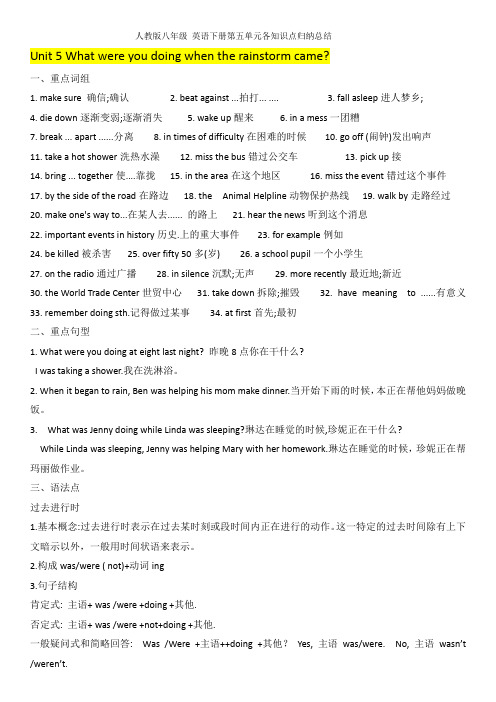
人教版八年级英语下册第五单元各知识点归纳总结Unit 5 What were you doing when the rainstorm came?一、重点词组1. make sure 确信;确认2. beat against ...拍打... ....3. fall asleep进人梦乡;4. die down逐渐变弱;逐渐消失5. wake up醒来6. in a mess一团糟7. break ... apart ......分离8. in times of difficulty在困难的时候10. go off (闹钟)发出响声11. take a hot shower洗热水澡12. miss the bus错过公交车13. pick up接14. bring ... together使....靠拢15. in the area在这个地区16. miss the event错过这个事件17. by the side of the road在路边18. the Animal Helpline动物保护热线19. walk by走路经过20. make one's way to...在某人去...... 的路上21. hear the news听到这个消息22. important events in history历史.上的重大事件23. for example例如24. be killed被杀害25. over fifty 50多(岁) 26. a school pupil一个小学生27. on the radio通过广播28. in silence沉默;无声29. more recently最近地;新近30. the World Trade Center世贸中心31. take down拆除;摧毁32. have meaning to ......有意义33. remember doing sth.记得做过某事34. at first首先;最初二、重点句型1. What were you doing at eight last night? 昨晚8点你在干什么?I was taking a shower.我在洗淋浴。
(完整版)人教版新目标八年级下册英语Unit5知识点

(完整版)人教版新目标八年级下册英语Unit5知识点人教版新目标八年级下册英语Unit5知识点Unit 5内容简介本单元主要介绍了关于过去事件的讨论和描述。
学生研究了过去完成时的用法,掌握了过去完成时态的构成、肯定句、否定句和疑问句的用法,并通过例句和练加深了对过去完成时的理解。
同时,学生还研究了如何根据图片提示以及其他相关信息准备口头报告。
Unit 5知识点总结1. 过去完成时态(Past Perfect Tense)- 过去完成时态表示在过去某一时间或动作之前已经发生或完成的动作或状态。
- 构成:had + 过去分词(had是过去完成时的助动词,根据主语变化,后接过去分词构成谓语)- 肯定句结构:主语 + had + 过去分词 + 其他- 否定句结构:主语 + hadn't + 过去分词 + 其他- 疑问句结构:Had + 主语 + 过去分词 + 其他?2. 过去完成时态的用法- 用于表示已经发生或完成的动作或状态,强调动作发生在过去某个时间之前。
- 指示两个过去发生的动作中,先发生的动作使用过去完成时,后发生的动作使用一般过去时。
Unit 5附加题目请回答以下问题:1. 过去完成时态的构成是什么?2. 过去完成时态的肯定句结构是什么?3. 过去完成时态可以用来表示什么?问题回答1. 过去完成时态的构成是had + 过去分词。
2. 过去完成时态的肯定句结构是主语 + had + 过去分词 + 其他。
3. 过去完成时态可以用来表示在过去某一时间或动作之前已经发生或完成的动作或状态。
人教版英语八年级下册英语第5单元知识点归纳

人教版英语八年级下册英语第5单元知识点归纳Unit 5: What were you doing when the rainstorm came?When you arrive at a small place。
use "arrive at"。
Whenyou arrive at a big place。
use "arrive in" or "reach" or "get to"。
For example。
"I arrived in Beijing last night" can also be said as"I reached Beijing last night" or "I got to Beijing last night"。
If the object is an adverb like "here"。
"there"。
or "home"。
you canomit "at/in/to"。
For instance。
"arrive here/there/home".Use "in front of" to describe something in front of a place beyond a certain range。
Use "in the front of" to describe something in front of a place within a certain range。
For example。
"There are some big trees in front of the classroom building" means that there are some big XXX"I like sitting in the front of the taxi" means that I like sitting in the front seat of the taxi.Take off" has three meanings。
人教版英语八年级下册第五单元知识点总结

人教版英语八年级下册Unit 5What were you doing when the rainstorm came?eful expressions.1.at the time of ...在...的时候2.wait for the bus at the bus stop在公交车站等车3.go off发出响声4.take a hot shower洗热水澡5. begin to rain heavily开始下大雨6.miss the bus误了车7.pick up接电话9. strong winds强风11.a heavy rainstorm一阵强风暴雨13. make sure确保15.play a card game玩纸牌17. fall asleep入睡19.wake up醒来21. fallen trees倒树23.join sb加入某人25.help each other彼此相互帮助27.take the car to the car wash送车去洗29.a car accident车事故31.have a look (at...)看33.the heavy snow大雪35. by the side of the road在马路边上37.make one way (to...)前往...39. in history在历史上41.over 50超过50岁43.at that time在那时45.be completely shocked完全被震惊了47. in silence安静地49.have meaning to sb对某人有意义51.look out of向外面看去53.tell the truth讲实话8.bring people closer致使人们更严紧10.black clouds黑云12.put pieces of wood over the windows将木头板覆盖在窗户上14.beat heavily agianst the windows利害的敲击着窗户16. at first刚开始18.die down逐渐消失20.find the neighborhood in a mess发现小区一团遭22. broken windows破窗户24. break ...apart使..支离破碎26. in times of difficulty:在困难时期28.listen to the radio听收音机30. the place of the accident事故发生地32.be in bad shape形状不佳34.Are you kidding?你开玩笑了?36. walk by路过38. the news of important events重大事件的洗牌40.on this day在这一天42. a school pupil小学生44.hear the news on the radio在收音机上收听消息46.the rest of剩余的...48.be taken down by terrorists被恐怖分子摧毁50.remember doing sth记得做过了某事52.be shocked to do sth做某事感到震惊54.not everyone并非每个人55. get killed=be killed被杀56.have trouble/problems/difficulty doing sth做某事有困难57.be important to对某人严重58.point sth out to sb向某人指出59.stop breathing停止呼吸60. call out the winner大声喊出赢家II. Key sentences1.---What was she doing at the time of the rainstorm? ---She was doing her homework.2.-What were you doing when the rainstorm came?-I was taking a shower when the rainstorm came.3.While Linda was sleeping,Jenny was helping Mary with her homework.4.With no light outside,it felt like midnight.5.Ben’s dad was putting p ieces of wood over the windows while his mom was making sure theflashlights and the radio were working.6.Ben was helping his mom make dinner when the rain began to beat heavily against the windows.7.He finally fell asleep when the wind was dying down at around 3:00 a.m.8.Although some people may not remember who killed him,they remember what they were doingwhen they heard the news.9.My parents were completely shocked.My parents did not talk after that and we finished the restof our dinner in silence.10.Even the date-September 11,2002-has meaning to most Americans.。
人教版八年级下册英语Unit 5单元语法知识点总结
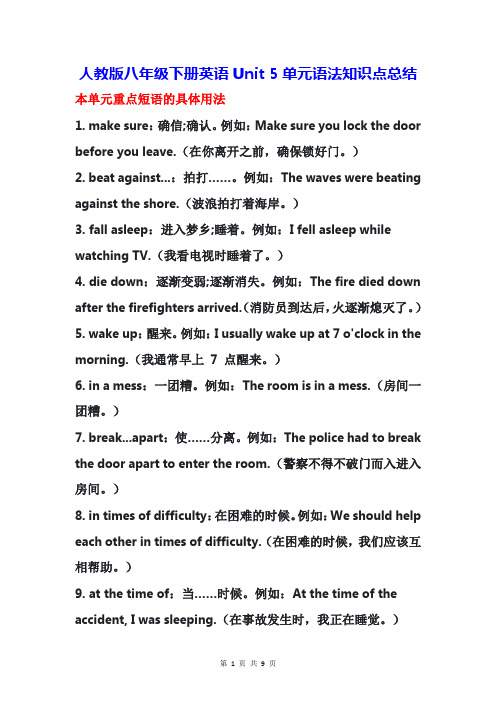
人教版八年级下册英语Unit 5单元语法知识点总结本单元重点短语的具体用法1. make sure:确信;确认。
例如:Make sure you lock the door before you leave.(在你离开之前,确保锁好门。
)2. beat against...:拍打……。
例如:The waves were beating against the shore.(波浪拍打着海岸。
)3. fall asleep:进入梦乡;睡着。
例如:I fell asleep while watching TV.(我看电视时睡着了。
)4. die down:逐渐变弱;逐渐消失。
例如:The fire died down after the firefighters arrived.(消防员到达后,火逐渐熄灭了。
)5. wake up:醒来。
例如:I usually wake up at 7 o'clock in the morning.(我通常早上7 点醒来。
)6. in a mess:一团糟。
例如:The room is in a mess.(房间一团糟。
)7. break...apart:使……分离。
例如:The police had to break the door apart to enter the room.(警察不得不破门而入进入房间。
)8. in times of difficulty:在困难的时候。
例如:We should help each other in times of difficulty.(在困难的时候,我们应该互相帮助。
)9. at the time of:当……时候。
例如:At the time of the accident, I was sleeping.(在事故发生时,我正在睡觉。
)10. go off:(闹钟)发出响声。
例如:The alarm went off at 6 o'clock.(闹钟在6 点钟响了。
Unit5--6知识点必背人教版初中英语八年级下册
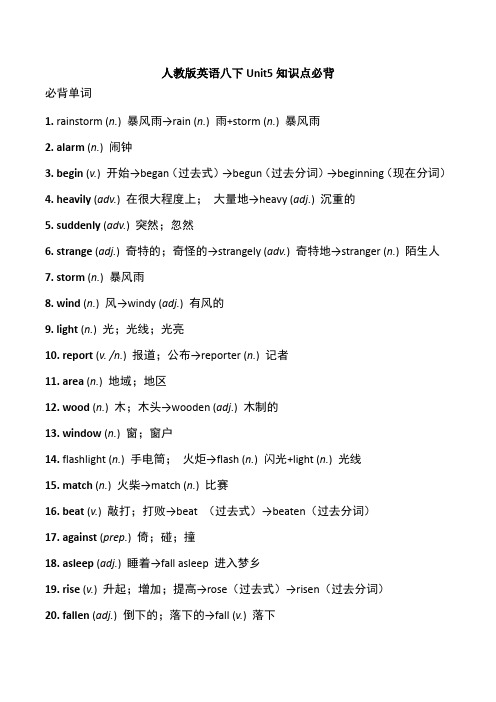
人教版英语八下Unit5知识点必背必背单词1. rainstorm (n.) 暴风雨→rain (n.) 雨+storm (n.) 暴风雨2. alarm (n.) 闹钟3. begin (v.) 开始→began(过去式)→begun(过去分词)→beginning(现在分词)4. heavily (adv.) 在很大程度上;大量地→heavy (adj.) 沉重的5. suddenly (adv.) 突然;忽然6. strange (adj.) 奇特的;奇怪的→strangely (adv.) 奇特地→stranger (n.) 陌生人7. storm (n.) 暴风雨8. wind (n.) 风→windy (adj.) 有风的9. light (n.) 光;光线;光亮10. report (v. /n.) 报道;公布→reporter (n.) 记者11. area (n.) 地域;地区12. wood (n.) 木;木头→wooden (adj.) 木制的13. window (n.) 窗;窗户14. flashlight (n.) 手电筒;火炬→flash (n.) 闪光+light (n.) 光线15. match (n.) 火柴→match (n.) 比赛16. beat (v.) 敲打;打败→beat (过去式)→beaten(过去分词)17. against (prep.) 倚;碰;撞18. asleep (adj.) 睡着→fall asleep 进入梦乡19. rise (v.) 升起;增加;提高→rose(过去式)→risen(过去分词)20. fallen (adj.) 倒下的;落下的→fall (v.) 落下21. apart (adv.) 分离;分开22. icy (adj.) 覆盖着冰的;冰冷的→ice (n.) 冰23. kid (v.) 开玩笑→kidded(过去)→kidded(过去分词)→kidding(现在分词)14. realize (v.) 理解;领会;认识到25. passage (n.) 章节;段落26. pupil (n.) 学生pletely (adv.) 彻底地;完全地→ complete (adj. ) 完全的28. shocked (adj.) 惊愕的;受震惊的→ shock (n.) 震惊29. silence (n.) 沉默;缄默;无声→ silent (adj.) 寂静的;无声的30. recently (adv.) 不久前;最近→ recent (adj.) 最近的31. terrorist (n.) 恐怖主义者;恐怖分子32. date (n.) 日期;日子33. tower (n.) 塔;塔楼34. truth (n.) 实情;事实→ true (adj.) 真实的→ (to) tell the truth 说实话必背短语1. go off(闹钟)发出响声2. pick up 接电话3. feel like 感觉好像4. wake up 睡醒;醒来5. die down 逐渐变弱;逐渐消失6. have a look 看一看7. make one’s way 前往;费力地前进8. in silence 沉默;无声9. take down 拆除;往下拽;记录10. have meaning to 对……有意义11. at first 起初;起先必背句子1. —What were you doing at eight last night?昨晚8 点你在做什么?—I was taking a shower. 我在洗淋浴。
人教版八年级英语下册第五单元知识点总结
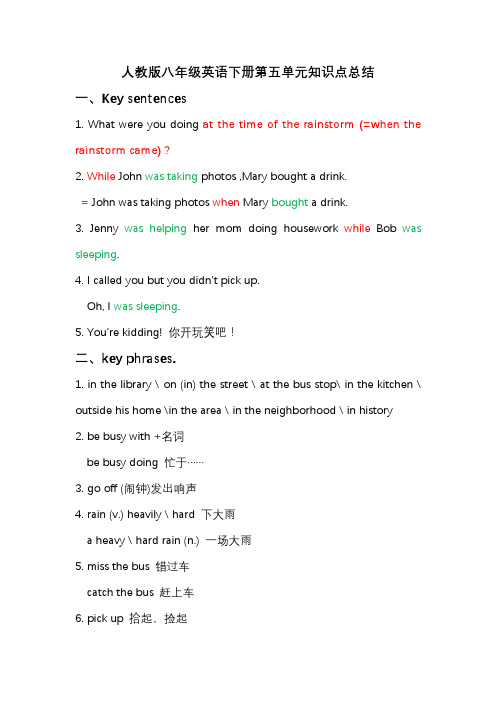
人教版八年级英语下册第五单元知识点总结一、Key sentences1. What were you doing at the time of the rainstorm (=when the rainstorm came) ?2. While John was taking photos ,Mary bought a drink.= John was taking photos when Mary bought a drink.3. Jenny was helping her mom doing housework while Bob was sleeping.4. I called you but you didn’t pick up.Oh, I was sleeping.5. You’re kidding! 你开玩笑吧!二、key phrases.1. in the library \ on (in) the street \ at the bus stop\ in the kitchen \ outside his home \in the area \ in the neighborhood \ in history2. be busy with +名词be busy doing 忙于……3. go off (闹钟)发出响声4. rain (v.) heavily \ hard 下大雨a heavy \ hard rain (n.) 一场大雨5. miss the bus 错过车catch the bus 赶上车6. pick up 拾起,捡起pick up the phone = answer the phone 接电话pick sb up 开车接某人7. bring sth together 把某物聚在一起bring sb together 把某些人聚到一起;使某些人团结起来8. make sure 尽力做到; 确保; 务必be sure 相信;确信9. make \ cook dinner 做晚饭10. beat against 拍打11. at first 起先(下文要转折,first 强调顺序)12. fall \go asleep =go \get to sleep 入睡13. die down 减弱;平息14. at around \ about 3 o’clock 在大约三点15. break...apart 分裂;解体16. by the side of the road 在路边17. walk by 走路经过18. be \ get killed 被谋杀;被害19. the rest =the other \others 剩下;剩余20. in silence 沉默21. take down 1) 摧毁;拆除2)取下;记下22. have meaning to 对……有意义23. look out 小心;当心look out of 向…… 外看24. by sb 被某人;由某人25. tell the truth 说实话tell a lie 说谎26. as well 也27. couldn’t \wouldn’t believe 难以相信28. make one's way to.... 在某人去……的路上29. in a mess 一团糟;乱七八糟30. the Animal Helpline 动物保护热线the World Trade Center 世贸中心31 point out 指出point at 指向(近)point to 指向(远)32. remember doing sth. 记得做过某事remember to do sth. 记得去做某事33. join sb to do (join sb for +n) 和某人一起做某事33. Recycling :wait for \ wake up \ look for \ take a shower \ help with \pieces of \ feel like \ play a card game \ for example \ have a look\ have trouble (in) doing sth. =have problems/difficulty (in) doing sth做某事有困难或麻烦三、key points1. 辨析:when while(1)表示“当……的时候”,如后面连接的动词为进行时态,则用while多于用when。
人教版丨八年级下册英语第5单元单词及重点知识归纳

suddenly [ ?s? d ? nli] adv. 突然地
pick up(=pick up the phone)
接电话
strange [stre ?nd ?] adj. 奇怪的,陌生的,奇特的
storm [st ?:m] n. 暴风雨
wind [wa ?nd] n. 风 light [la ?t] n. & v. 电灯 ;点燃 report [ri ?p ?:t] v. 报导,报告 area ['e ? r?? ] n. 范围,地域,地区 wood [w ? d] n. 树木,木材,树木 window [ ?wind ? u] n. 窗户 flashlight ['fl? ?la ?t] n. 手电筒,火炬 match [m?t ?] n. 火柴,比赛 beat [bi:t] v. 敲打,打败 against [ ??genst] prep. 反对,对…不利 asleep [ ??sli:p] adj. 睡着的,熟睡的
如果宾语是副词 here, there, home, 要把 at/in/to 省略。
21. hear the news 听到这个消息
22.important events in history
历史上的重大事件
23.for example 例如
24.be killed 被杀害
25. over 50 50 多 (岁)
26. a school pupil 一个小学生
27. on the radio 通过广播
8. in times of difficulty
在困难的时候
9. at the time of 当 .......时候
10. go off ( 闹钟 ) 发出响声
人教版八年级英语下册Unit5重难点知识总结
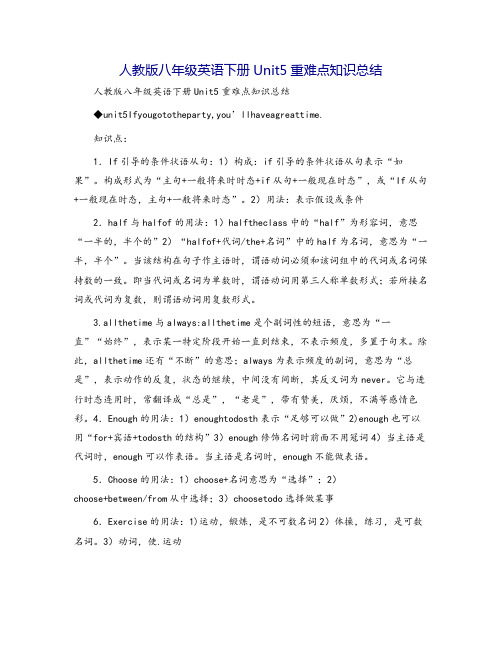
人教版八年级英语下册Unit5重难点知识总结人教版八年级英语下册Unit5重难点知识总结◆unit5Ifyougototheparty,you’llhaveagreattime.知识点:1.If引导的条件状语从句:1)构成:if引导的条件状语从句表示“如果”。
构成形式为“主句+一般将来时时态+if从句+一般现在时态”,或“If从句+一般现在时态,主句+一般将来时态”。
2)用法:表示假设或条件2.half与halfof的用法:1)halftheclass中的“half”为形容词,意思“一半的,半个的”2)“halfof+代词/the+名词”中的half为名词,意思为“一半,半个”。
当该结构在句子作主语时,谓语动词必须和该词组中的代词或名词保持数的一致。
即当代词或名词为单数时,谓语动词用第三人称单数形式;若所接名词或代词为复数,则谓语动词用复数形式。
3.allthetime与always:allthetime是个副词性的短语,意思为“一直”“始终”,表示某一特定阶段开始一直到结束,不表示频度,多置于句末。
除此,allthetime还有“不断”的意思;always为表示频度的副词,意思为“总是”,表示动作的反复,状态的继续,中间没有间断,其反义词为never。
它与进行时态连用时,常翻译成“总是”,“老是”,带有赞美,厌烦,不满等感情色彩。
4.Enough的用法:1)enoughtodosth表示“足够可以做”2)enough也可以用“for+宾语+todosth的结构”3)enough修饰名词时前面不用冠词4)当主语是代词时,enough可以作表语。
当主语是名词时,enough不能做表语。
5.Choose的用法:1)choose+名词意思为“选择”;2)choose+between/from从中选择;3)choosetodo选择做某事6.Exercise的用法:1)运动,锻炼,是不可数名词2)体操,练习,是可数名词。
- 1、下载文档前请自行甄别文档内容的完整性,平台不提供额外的编辑、内容补充、找答案等附加服务。
- 2、"仅部分预览"的文档,不可在线预览部分如存在完整性等问题,可反馈申请退款(可完整预览的文档不适用该条件!)。
- 3、如文档侵犯您的权益,请联系客服反馈,我们会尽快为您处理(人工客服工作时间:9:00-18:30)。
Unit5 What were you doing when the rainstorm came?1. arrive at 到达(小地方)arrive in到达(大地方)reach到达get to 到达I arrived in Beijing last night. = I reached Beijing last night .= I got to Beijing last night .如果宾语是副词here, there, home, 要把at/in/to省略。
arrive here/there/homeget here/there/home2. in front of… 在… 的前面(某一范围外的前面)在… 的前面(某一范围内的前面)in the front of … There are some big trees in front of the classroom building. 在教室的前面有一些大树。
I like sitting in the front of the taxi. 我喜欢坐在出租车的前排位置。
3. take off(1)起飞When did the plane take off yesterday? 飞机什么时候起飞?(2)脱下(衣帽等)He took off his coat as soon as he went into the room. 他一进房间就脱掉了外套。
(3)取消They will take off the 5 am train . 他们取消了早上5点的火车。
4. get out (of ) … 从……离开/出去/下来A car stopped and a girl got out of it.但从汽车/火车/船/飞机/马匹上下来,用get off…5. follow(1)跟随 I followed him up he hill. 我跟着他上了山.(2)沿着……前进Follow this road until you get to the post office. 顺着这条路一直到邮局.(3)听懂,理解Could you speak more slowly? I can’t follow you. 你能说慢点吗?我听不懂。
(4)follow sb. to do sth. 跟着某人做某事Please follow me to read the story. 请跟我读这个故事。
6. shout at 大声喊叫,多指因生气而非善意的大声叫喊Don’t shout at the little boy. He is too young. 不要对他大叫,他还太小。
shout to 大声喊叫,多指因距离远而不得不大声叫喊us.我们应该朝他叫喊,否则他听不到We should shout to him , or he can’t hear我们的声音。
7. happen 发生,具体事件偶然的没有预见的发生(1)happen to do sth. 碰巧做某事I happened to meet one of my old friends in the park yesterday .昨天我在公园碰巧遇见我的一个老朋友。
(2)sth happens to sb. 某人发生了某事An car accident happened to him last month. 上个月他发生了交通事故.take place 发生(1)按计划进行或按计划发生Great changes have taken place in China in recent years. 最近几年中国发生了巨大的变化.(2)(运动/活动/会议等)举行The meeting will take place next Friday. 运动会将于下星期五举行。
take the place of 代替,取代Plastics can sometimes take the place of wood and metal . 塑料有时能代替木材和金属.take one’s place 坐某人的位置,代替某人的职务Come to take my place. my seat is near the window . 来做我的位置,我的座位靠近窗户。
8. anywhere 任何地方,常用于否定句或疑问句中.Did you go anywhere last night? 你昨天还去了别的地方了吗?somewhere某个地方,用于肯定句。
come and see me. Then we’ll go out somewhere. 来我家找我,然后我们出去逛逛。
everywhere处处,到处= here and thereI can’t find my pen though I looked for it everywhere. 尽管我到处都找过了,还是找不到我的钢笔。
11. silence 名词,寂静/无声There’s nothing but silence in the room. 屋内寂静无声。
Keep in silence. 保持沉默.silent形容词,沉默的,寂静的The old house was quite silent. 这所老房子寂静无声。
The cat moved on silent feet. 那只猫无声地走动着。
12. hear 听到Can you hear someone knocking at the door? 你听到有人敲门了吗?(1)hear of 听说,后接表示人或物的词I have never heard of him before. 我以前从来没有听说过他。
( 2 ) hear about 听说,后接表示事件的名词I’ve just heard about his illness. 我刚刚听说他生病的事。
Have you heard about the accident ? 你听说了那场事故吗?(3)hear from 收到某人的来信I heard from my daughter in New York yesterday. 我昨天收到在纽约的女儿的来信。
13.主语+ be + one of the + 形容词最高级+复数名词+ in / of 短语。
…… 是……中最……的……之一.This was one of the most important events in modern American history. 这是美国历史上最重要的事件之一。
Xiamen is one of the most beautiful cities in China. 厦门是中国最漂亮的城市之一。
13. experience(1)名词经验,不可数名词;经历,体验,可数名词Have you had any experience of fishing? 你有钓鱼的经验吗?Could you tell us about your experiences in Africa? 你能给我们谈谈你在非洲的经历吗?(2)动词经历,感觉The children experienced many difficulties this time.这次孩子们经历了许多困难.experienced形容词有经验的be experienced in/at doing sth. = have much experience in/at doing sth. 做某事很有经验.She is an experienced teacher. 他是一个经验丰富的教师。
He is very experienced in/at repairing cars. 他修车很有经验。
14. as … as … 和…… 一样… 两个as之间用形容词或副词的原形。
He works as carefully as she. 他和她一样工作认真。
She is as tall as her mother. 她和母亲一样高。
not as… as…不如某人/某物…He isn’t as / so old as he looks . 他不像看起来那么老。
She doesn’t run as / so fast as her brother. 她不如她哥哥跑得那么快。
15. have fun = have a good/great/wonderful time = enjoy oneself 玩得开心,过得愉快Did you have fun at the party? 昨天在派对上玩的开心吗?= Did you have a good/great/wonderful time ?= Did you enjoy yourself ?have fun doing sth. 开心做某事I’m just having fun playing the guitar . 我正开心的弹吉他呢。
16. accident 事故,意外遭遇He was killed in an accident. 他死于一起意外事故.traffic accident 交通事故Many people die in traffic accidents every year. 每年有很多人死于交通事故。
by accident 偶然,意外地We met at the airport by accident . 我们偶然在机场遇见。
18. think about 考虑(某个计划)They are thinking about moving to Beijing. 他们考虑搬去北京。
think of 认为 What do you think of the movie?= how do you like the movie? 你认为这部电影怎么样?think over 仔细思考We need a few days to think over this matter. 我们需要几天时间来考虑这个事情。
19.感叹句what引导的感叹句(1)What a beautiful girl (she is )! 多么美的姑娘呀!(2)What a clever boy ( he is )! 多么聪明的男孩呀!(3)What interesting pictures ( they are )! 多么美的图片呀!(4)What tall buildings ( they are )! 多么高的楼呀!(5)What delicious food ( it is ) ! 多么可口的食物呀!(6)What bad weather ( it is ) ! 多么坏的天气呀!规律:what + ( a/an ) + 形容词+名词( + 主语+谓语) + !名词为不可数名词或复数名词时,形容词前面不能有a/an。
